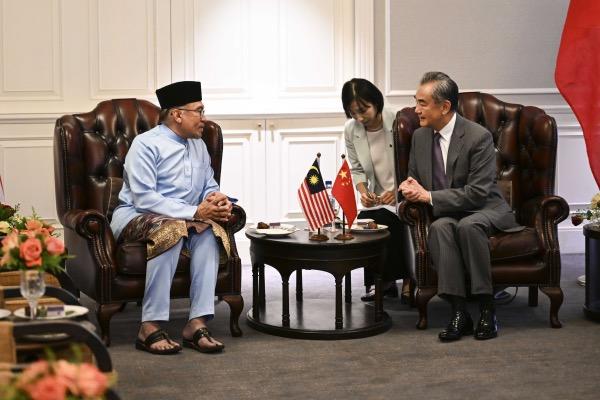By Hannan Hussain
From August 10 to 13, Chinese Foreign Minister Wang Yi, who is also a member of the Political Bureau of the Communist Party of China (CPC) Central Committee, embarked on a three-nation tour to Singapore, Malaysia and Cambodia. Wang backed calls for upholding peace and consultative diplomacy with ASEAN while welcoming new prospects for bilateral cooperation with all three nations.
As a time-tested diplomatic partner of ASEAN, China's support for the early conclusion of a Code of Conduct in the South China Sea (COC) is imperative for peace in the region. Wang's remarks during his visit to Malaysia and Singapore echoed the collective belief in resolving maritime differences through consultative diplomacy. The Philippine vessels' recent intrusions into the adjacent waters of Ren'ai Jiao reinforce the need for regional parties to jointly prioritize the long-standing consensus on maritime stability, and prevent disruptive forces such as the United States from instigating confrontation and sowing discord among regional neighbors.
On the bilateral level, Wang's substantive talks with Singaporean Prime Minister Lee Hsien Loong laid important groundwork for deepening economic cooperation. Singapore reaffirmed its support for China's accession to the Digital Economy Partnership Agreement (DEPA) and signaled its determination to learn from Beijing's modernization drive. Both sides are also likely to accelerate progress through key government-to-government projects in China's Suzhou, Tianjin and Chongqing while facilitating positive momentum in the lead-up to the 15th anniversary of the Sino-Singapore Tianjin Eco-City.
The China-Singapore relationship already struck an impressive milestone during Lee's visit to Beijing earlier this year. The relationship transformed into an "all-round, high-quality, future-oriented partnership," and strikes a principled contrast to any external attempts at imposing unipolar hegemony, protectionism, and anti-competitive practices in the region. "China's development is the growth of peaceful forces and the enhancement of stabilizing factors, which will bring lasting benefits and development opportunities to all countries in the world, especially the neighboring countries," Wang told Lee during their exchange.
Tangible progress also informs China's support for "mega-market opportunities" and more Chinese investments in Malaysia. Wang expressed his intent during high-level talks with Prime Minister Anwar Ibrahim, making steady progress under key Belt and Road projects such as the East Coast Rail Link (ECRL), a proof-point.

Malaysian Prime Minister Anwar Ibrahim (L) meets with Chinese Foreign Minister Wang Yi in Penang, Malaysia, August 11, 2023. [Photo/Chinese Foreign Ministry]
After all, Beijing continues to serve as Malaysia's top trading partner for 14 years, making it imperative for both sides to expand what Anwar described as a special and friendly relationship "with robust" bilateral cooperation. "Chinese companies are welcome to expand investment in Malaysia, and Malaysia stands ready to deepen cooperation with China in various fields to achieve mutual benefit and win-win results," said the Malaysian prime minister. Efforts to build on bilateral trade volume worth $203.6 billion last year is a major leap forward.
Wang's touchdown in Cambodia also arrived on the heels of the 65th anniversary of China-Cambodia diplomatic relations. High-level engagements lend new optimism to the seamless advancement of the BRI, given Cambodia's active engagement and acceleration of win-win infrastructure, energy, and agriculture projects for its people.
In Wang's meeting with Cambodian Deputy Prime Minister and Foreign Minister-designate Sok Chenda Sophea, he demonstrated ample recognition of Cambodia's approach to rapid development and recent foreign investment gains. The resulting symbolism and diplomatic trust can illuminate new market opportunities, such as early understandings between both sides to drive forward the China-Cambodia Free Trade Agreement (FTA).
As Cambodia's largest trading partner and a vital source of investment and tourism, Beijing stands committed to bolstering relations through dialogue coordination mechanisms, and helping deepen their comprehensive strategic partnership in the process.
Ultimately, Wang's three-nation Southeast Asia tour played a key role in welcoming new growth points with a time-tested ASEAN partnership. At the same time, China and ASEAN's commitments to enduring peace, stability and development in their neighborhood continue to take on paramount importance.
Hannan Hussain, a special commentator on current affairs for CGTN, is a foreign affairs commentator, author and assistant research associate at the Islamabad Policy Research Institute.

 中文
中文



